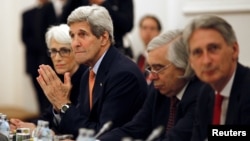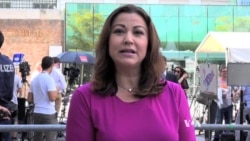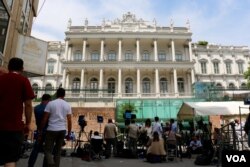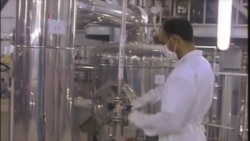A senior U.S. official said Tuesday that a nuclear deal with Iran is still possible, if parties involved in the negotiations return to the table ready to make tough political choices.
"We are probably closer than we’ve ever been because there is more of an alignment of that moment in history," the official, who did not wish to be named, told reporters in Vienna, adding, “We don’t know if we can get there.”
Marie Harf, spokeswoman for the U.S. delegation, gave similar indications earlier in the day, telling reporters, “We've made substantial progress in every area, but this work is highly technical and high-stakes for all of the countries involved.”
Search for breakthrough
The comment followed an early morning meeting between U.S. Secretary of State John Kerry, Iranian Foreign Minister Mohammad Javad Zarif and other top diplomats in search of a breakthrough.
Later, the so-called P5 +1 nations — the U.S., Britain, France, Russia, China and Germany — announced that they could not reach a comprehensive agreement by a July 7 deadline, agreed upon last week when a June 30 deadline expired, and would continue talks in Vienna.
Talks have now been extended until Friday.
Iranian negotiators had said there are no definitive deadlines. And Harf said the United States is "frankly more concerned about the quality of the deal than we are about the clock."
While acknowledging that "significant differences" remain, the White House said the talks created an opportunity to resolve the major differences that still exist and that it was worth continuing if a deal is close.
However, a Western diplomat in Vienna said the nuclear talks are not "open- ended" and have just been extended for the last time.
The envoy from an unnamed country told reporters Tuesday that "it's difficult to see why and how we could go on any longer. Either this works in the next 48 hours or it doesn't."
WATCH: Mary Alice Salinas reports from Vienna
Sticking points
Officials in Vienna say three main sticking points remain to be hashed out: sanctions, a new draft U.N. resolution, and terms of inspections of Iran’s nuclear sites.
The agreement between Iran and the six powers would cut Iran's uranium enrichment program to keep it from being able to build a nuclear weapon. Sanctions that have wrecked the Iranian economy would be eased and eventually lifted.
But a key stumbling block continued to be a push by Tehran to eliminate an arms ban and ballistic missile restrictions contained in a new draft resolution being crafted by the P5+1 for the U.N. Security Council’s consideration. And Iran is also balking at Western demands for inspections of its military sites to verify it is living up to the deal.
“We all believe the restrictions have to stay on the United Nations Security Council resolution,” the U.S. official explained. “The duration of that, the nature of it, how we will proceed, what the United Nations Security Council resolution is like, all of that is part of this negotiation.”
German Foreign Minister Frank-Walter Steinmeier added that Iran needed to "help build trust" by complying with monitoring demands.
"This means that we have to have monitoring possibilities available to have an overview as to whether Iran is fulfilling its obligations. We need to be sure that we have transparency concerning the promises Iran is making here," he told German broadcaster ARD.
As he was leaving the talks, Russian Foreign Minister Sergei Lavrov said questions pertaining to easing sanctions had been resolved, according to the Russian news agency RIA Novosti. Lavrov indicated there was still more negotiating to do, and that he planned to return to Vienna later in the week.
“Everything is moving, moving,” Lavrov said.
In Tehran, lawmaker Mansour Haqiqatpour said reaching a nuclear deal would depend on the six world powers' "decisiveness and resolve."
"We will not accept anything other than a good deal based on the Islamic
Republic of Iran's criteria," he said.
April deal remains in place
Meanwhile, the six negotiating powers said an interim deal with Tehran made in April will remain in place until July 10, giving officials more time to strike a final agreement.
If a deal is reached by Thursday, the U.S. Congress would have 30 days to review it and vote on whether to lift certain sanctions that lawmakers have imposed. After Thursday, the review period becomes 60 days.
Additional material for this report came from Reuters and AFP.
WATCH: Nuclear deal with Iran would be complex









